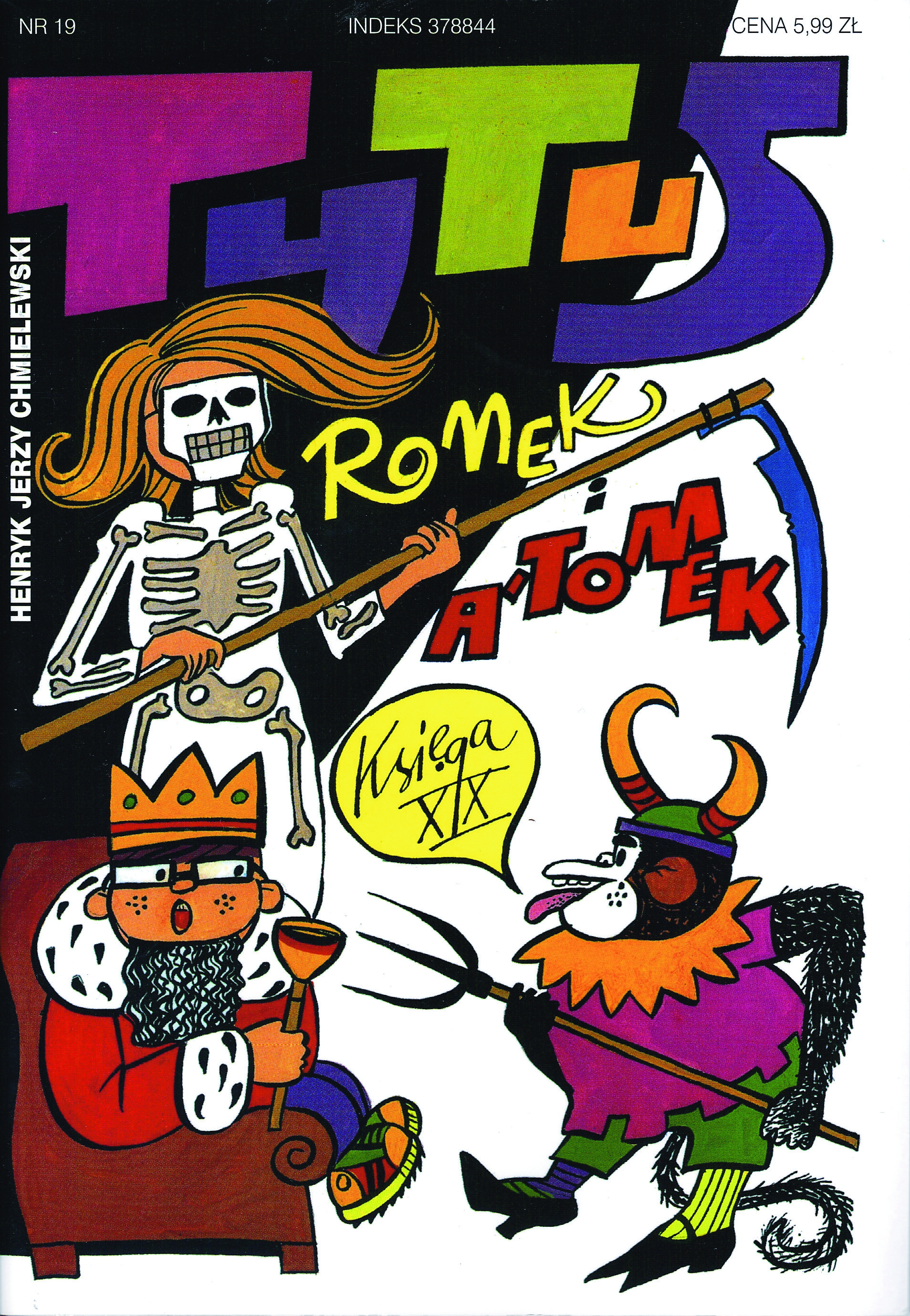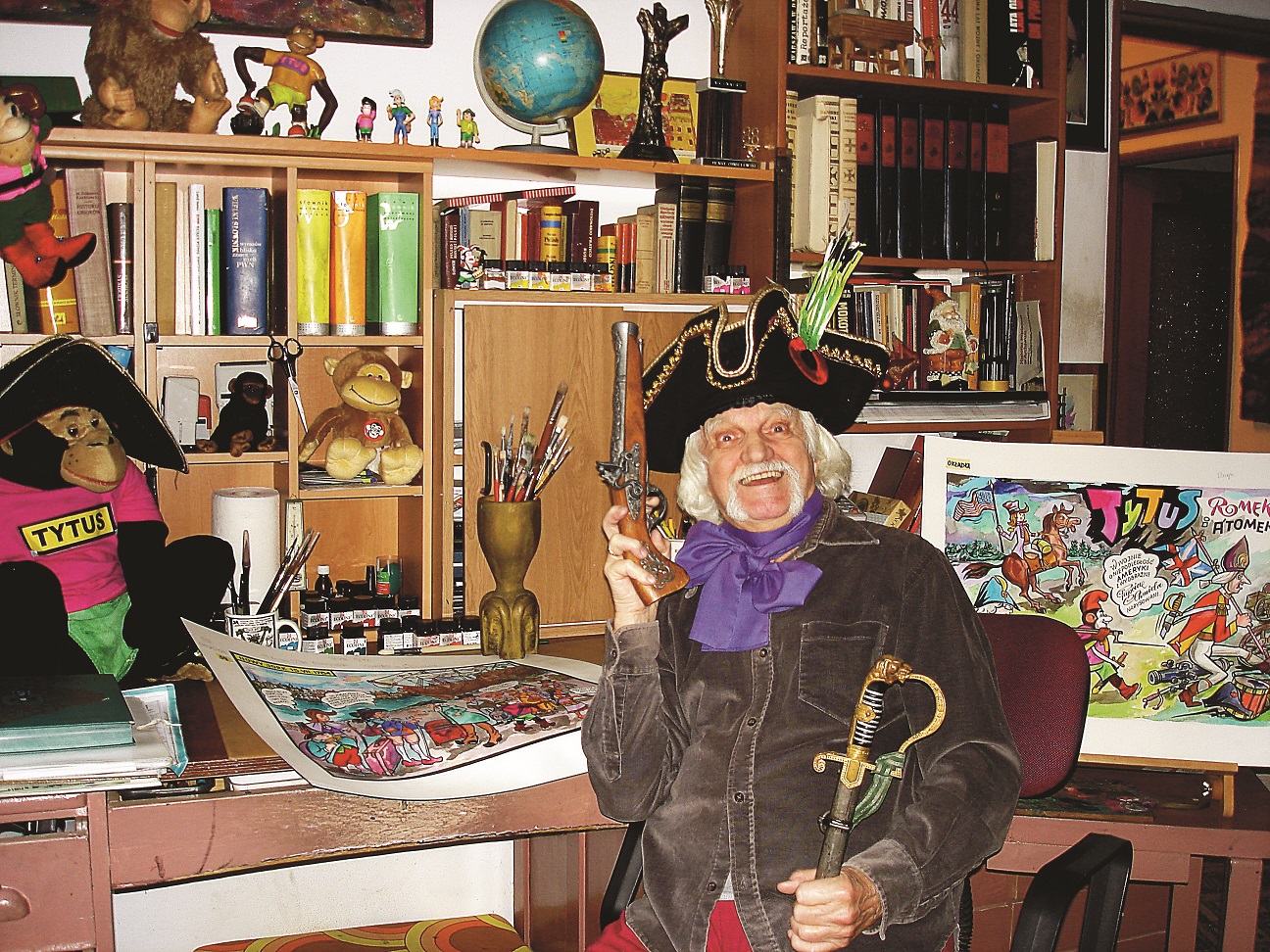Title of the work
Country of the First Edition
Country/countries of popularity
Original Language
First Edition Date
First Edition Details
Henryk Jerzy Chmielewski, Tytus, Romek i A’Tomek. Księga XIX – Tytus aktorem. Warszawa: Prószyński i S-ka, 1992, 64 pp.
ISBN
Genre
Comics (Graphic works)
Target Audience
Crossover (Children, teenagers, young adults)
Cover

Courtesy of Prószyński Media, the publisher.
Author of the Entry:
Summary: Agnieszka Gąsior, University of Warsaw, aga.gasior@op.pl
Analysis: Marta Pszczolińska, University of Warsaw, m.pszczolinska@al.uw.edu.pl
Peer-reviewer of the Entry:
Katarzyna Marciniak, University of Warsaw, kamar@al.uw.edu.pl
Elżbieta Olechowska, University of Warsaw, elzbieta.olechowska@gmail.com

Courtesy of the Author.
Henryk Jerzy Chmielewski
[Papcio Chmiel] , 1923 - 2021
(Author, Illustrator)
Comic book writer, graphic artist and journalist; as a soldier of Armia Krajowa [Home Army] with code-name “Jupiter” he took part in the Warsaw Uprising (1944); illustrator for a teens magazine Świat Młodych; author of many comic book series, including the widely popular Tytus, Romek i A’Tomek [Tytus, Romek and A’Tomek], a well above 30-part comic book series about a talking chimpanzee who tries to become human; awarded the Gloria Artis Medal for Merit for Culture (Gold Class), the Warsaw Cross of the Uprising, the Commander’s Cross of the Order Polonia Restituta (for outstanding achievements in national culture) and the Order of the Smile, an international award (launched in Poland in 1968) given by children to people distinguished in their pro-children activities.
Source:
Official website (accessed: July 4, 2018).
Bio prepared by Magdalena Łokieć, University of Warsaw, magdalena.anna.lokiec@student.uw.edu.pl.
Sequels, Prequels and Spin-offs
Books I– XXXI:
Tytus, Romek i A'tomek: Księga VI – Tytus olimpijczykiem [Tytus, Romek and A’Tomek, Book 6: Tytus Becomes an Olympic Athlete], Warszawa: Wydawnictwo Harcerskie „Horyzonty”, 1971, 56 pp.
Tytus, Romek i A’Tomek. Księga XV – Tytus Geologiem [Tytus, Romek and A’Tomek. Book 15: Tytus Becomes a Geologist], Warszawa: Młodzieżowa Agencja Wydawnicza, 1982, 64 pp.
Summary
Based on: Katarzyna Marciniak, Elżbieta Olechowska, Joanna Kłos, Michał Kucharski (eds.), Polish Literature for Children & Young Adults Inspired by Classical Antiquity: A Catalogue, Faculty of “Artes Liberales”, Warsaw: University of Warsaw, 2013, 444 pp.
Three main characters, Tytus – a chimpanzee, and his human friends: Romek and A’Tomek are going to the theatre, but Tytus does not know how to behave there so the two boys decide to show him the history of performances and actors. The friends start the journey through different periods by means of imagination, playing roles of historical performers. First, they travel to prehistoric times, and participate in a cult of an imagined goddess asking her for abundant hunting. Then they move to Ancient Greece. There Tytus learns about Greek theatre and culture. Later, they go to Rome, where Tytus becomes a gladiator. After all those "ancient" adventures, the boys return to Poland, where, in different periods of time (the Middle Ages, the 19th and 20th century, WW2) they play and watch a variety of shows such as Nativity or puppet shows, and form a comedy troupe. At the end of all this action, Tytus learns the rudiments of theatre and the basic rules how to behave during a show. He is now ready to go to a real theatre.
Analysis
In this comic book, the references to Antiquity are introduced by the agency of two different scenes. The characters, using their imagination, reach out to historical times in order to explore the beginnings and development of theatre and spectacles – they travel in their thoughts to ancient Greece first, and then to Rome.
In the part of the comic book pertaining to Greek Antiquity, Tytus and the boys "arrive" at a typical Mediterranean house planted with grapevines. They ask a few passers-by, dressed in ancient garments, to show them the way to the theatre of Dionysus. A bearded man considers them to be "foreigners" as they are wearing contemporary outfits and are not paying enough tribute to Dionysus. He instructs them which way to go – both his directions and the illustrated background suggest that the characters appeared in the ancient Athens of the 2nd century or later (a local resident warns that the Odeon of Herodes Atticus, built in 161 AD, which they will see on the way looks similar to a theatre). At the theatre, the boys tell Tytus when and how the Athenian Dionysian theatre developed, who used to perform there and how, but also which of the Muses used to sponsor the theatre arts: they name Melpomene, Polyhymnia, Terpsichore and Thaleia. In the descriptions of the Muses, the author used a typestyle resembling the "Greek" font – e.g., uppercase Sigma instead of "E". In order to consolidate their knowledge, the boys suggest that they re-enact a scene from the Iliad. As they change into stage costumes, masks and buskins and begin to play, Tytus disappears in search of another, far less serious and dramatic entertainment. Instead of going to a discotheque, unknown in the ancient time, a misunderstanding leads him to a pinacotheca. Having deemed a painting and sculpture exhibition of the Greek gods and heroes a boring museum (including a Discobolus’ statue), Tytus jokes next to a painting of Zeus. The guards in Corinthian helmets and with snakes on their shields consider this to be an offence and an insult to the god, for which they seize Tytus and drag him across the streets of the city to the guard of goddess Athena. Then his friends find him and convince the guards he is their slave and rescue Tytus, for which they have to pay a fine of a few drachmas.
Along with the chronology of theatre, the next imaginary journey takes them to ancient Rome. Therefore, Romek and A’Tomek decide that Tytus should learn some Latin from a pocket dictionary by Kazimierz Kumaniecki, which seems to be an easy task, as the examples given for Latin words spell and sound just like the Polish equivalents (e.g. horror – horror, chirurgia – chirurgia (surgery), senator – senator or temperatura – temperatura (temperature) etc.). The studying ends with a fight as they reach the word idiota (an idiot – NB derived from the Greek ἰδιώτης through Latin), which Tytus thinks is an invective against him. The three friends then "travel" to games at the Flavian Amphitheatre in its times of glory, although its later name – Colosseum – was used. A’Tomek, dressed in armour with the Roman eagle and a laurel wreath on his head, finds himself in a luxury box as the Emperor, with Romek as his consul, wearing a corona muralis wreath. Tytus, as a gladiator, however, is forced to fight in the arena like a regular slave in order to learn about the Roman games from the inside. Tytus and his opponent, who is a robust and well-built man, are both wearing only a waist-cloth and carrying Roman swords (gladius) and small, round shields. On Tytus’s shield there is a smiling sun and on his opponent’s – a symbol of late 18th-century piracy – a Jolly Roger. Before the confrontation, the gladiators exclaim the Latin phrase Ave Cesar, morituri te salutant and start fighting. Tytus prevails using his flatulence, and as he is forced into overtime, he again uses a trick to win with a stronger gladiator. In the next part of the games Tytus is to fight with a wild beast (a reference to venationes), but the lion kept in a cage goes on strike until the Emperor complies with its request, so a huge, wild and pugnacious elephant is let out instead. Clever Tytus makes the elephant snatch Romek from the tribunes, which brings an end to the Roman adventure and the characters return to their own reality.
The author used these two short scenes to showcase characteristic and important aspects of spectacles and theatre in the Greek and Roman world. The factual information in the comic book is presented in an enjoyable and accessible, amusing way. It displays to the young reader – and a future theatre audience – knowledge taught at school, generally in a less entertaining manner.
Further Reading
The Author’s website (accessed: September 21, 2020).


